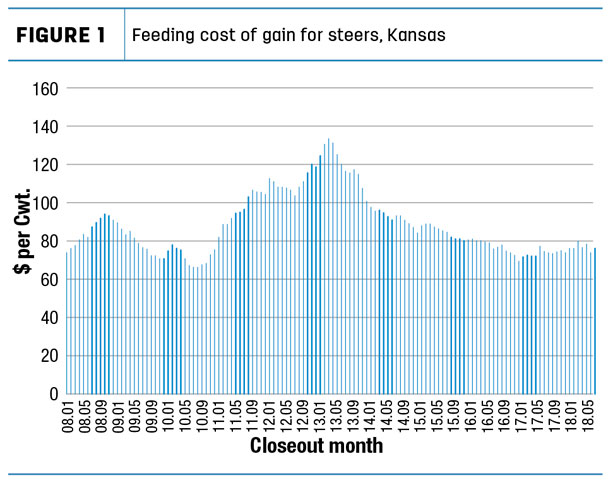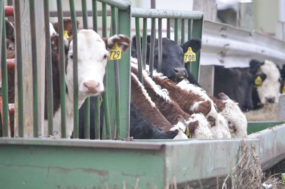Figure 1 illustrates feeding cost of gain from January 2008 to June 2018. Feeding cost of gain information was obtained from monthly issues of the Focus on Feedlots newsletter by Kansas State University. Feeding cost of gain has dropped significantly since its annual peak in 2013 of $120 per hundredweight (cwt). In 2017, feeding cost of gain averaged $74.35 or approximately 38 percent lower than what it was in 2013. Given current corn and alfalfa price projections, and seasonal trends in animal performance, feeding cost of gain is expected to range from $74 to $76 for the second half of 2018.

Feeding cost of gain is sensitive to changes in feed conversions, corn prices and alfalfa prices. Using the relationship between feeding cost of gain and feed conversion, corn prices and alfalfa prices, each 0.1-pound increase in feed conversion increases feeding cost of gain by $1.32 per cwt, each 10-cent-per-bushel increase in corn prices increases feeding cost of gain by $1.06 per cwt, and each $5-per-ton increase in alfalfa prices increases feeding cost of gain by 52 cents per cwt. Using a corn price of $3.85 per bushel, a 25-cent-per-bushel decline (increase) in corn price would result in a $2.65-per-cwt decrease (increase) in feeding cost of gain. Seasonal changes in animal performance, particularly in winter months, also impacts feeding cost of gain. In the winter, feeding conversion is typically 0.2 pounds higher than the annual average. This would add $2.64 per cwt to the feeding cost of gain.
As indicated above, we are not expecting historically large movements in feeding cost of gain in the next few months. However, if weather negatively impacts feeding cost of gain and the corn price increases 25 cents per bushel, we could easily see an increase of feeding cost of gain of $5 per cwt. This would result in a feeding cost of gain above $80 per cwt. Conversely, with good weather and lower corn prices, feeding cost of gain could be as low as $70 per cwt later this year. ![]()
Michael Langemeier is with the Center for Commercial Agriculture at Purdue University. Email Michael Langemeier.








